As support for same-sex marriage has increased, other attitudes about homosexuality have changed as well. Majorities now say homosexuality should be accepted by society (63%) and that the sexual orientation of a gay or lesbian person cannot be changed (60%). Nearly half (47%) say that people are born gay or lesbian. These opinions represent a shift over the past decade, even if in some cases the short-term changes have been modest.
In addition, a 54% majority says there is no conflict between their own religious beliefs and homosexuality, up from 48% in 2013. However, the view that homosexuality and one’s personal religious beliefs are in conflict remains a powerful factor in opposition to same-sex marriage.
An overwhelming majority of the public (88%) reports personally knowing someone who is gay or lesbian. That is little changed since 2013, but much higher than in the early 1990s.
Gay and Lesbian Acquaintances, Friends and Family Members
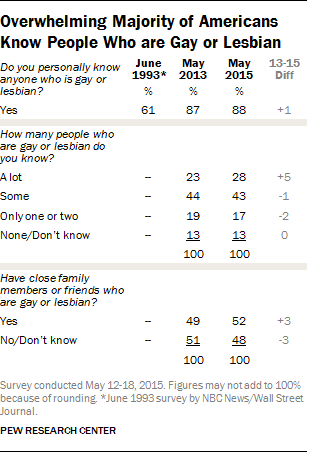
Though the vast majority of Americans say they know gays or lesbians, just over a quarter (28%) say they know “a lot” of people who are gay or lesbian, while 43% say they know some and 17% say they only know one or two gays or lesbians. Slightly more people now say they know a lot of gays or lesbians than did so two years ago.
And, as in 2013, about half (52%) have a close family member or one of their closest friends who is gay or lesbian.
While large majorities of almost all demographic and partisan groups say they know someone who is gay or lesbian, there are differences in both the number of gay and lesbian acquaintances people have and in whether people say they have close family members or friends who are gay.
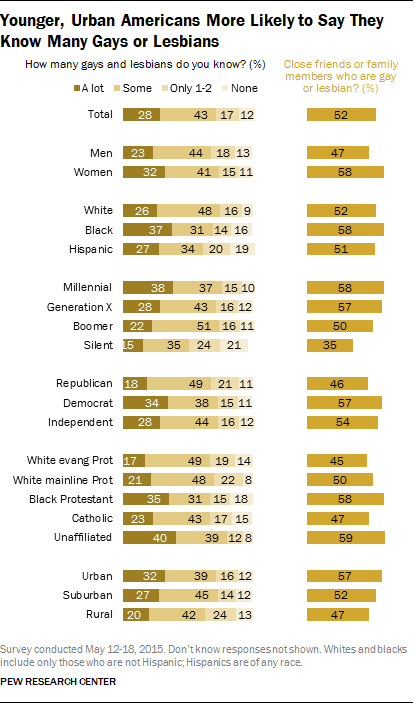
Millennials are among the most likely of any demographic or partisan group to say they know a lot of people who are gay or lesbian: Nearly four-in-ten (38%) say so, compared with fewer Gen Xers (28%), Boomers (22%) and Silents (15%). And about twice as many Silents say they do not know any gays or lesbians (21%) as members of any other generation.
Millennials and Xers are also somewhat more likely than Boomers – and particularly Silents – to say they have close family members or friends who are gay.
There are differences by religious affiliation in the number of gays and lesbians people know. Fully four-in-ten (40%) of those who are not affiliated with a religion say they personally know a lot of gays and lesbians, while 8% say they know none. By contrast, just 23% of Catholics, 21% of white mainline Protestants and 17% of white evangelical
Protestants report having a lot of gay and lesbian acquaintances. There are also similar — if somewhat more modest — differences across religious groups in those who report having close friends and family members who are gay.
About a third of Democrats (34%) say they know a lot of gays and lesbians, compared with just 18% of Republicans. And while 57% of Democrats (and 54% of independents) have a gay or lesbian close family member or friend, 46% of Republicans say this.
There are also divides by community type: People who live in urban areas (32%) are more likely to know a lot of people who are gay and lesbian than those who live in suburban (27%) or rural (20%) communities.
Gay or Lesbian Friends and Support for Same-Sex Marriage
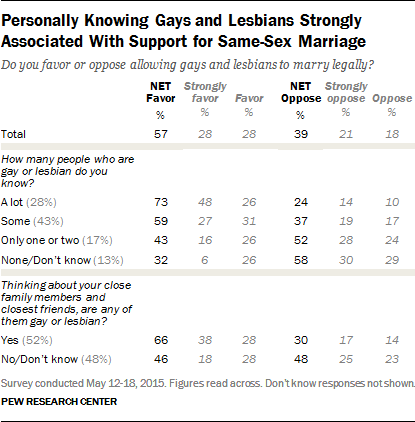
About three-quarters (73%) of those who know a lot of gays and lesbians – and two-thirds (66%) of those who have gay or lesbian close friends or family members – say they support same-sex marriage. And nearly half (48%) of Americans with many gay acquaintances, and 38% of those who have close friends or family who are gay, strongly favor allowing gays and lesbians to marry legally.
There is far less support for same-sex marriage among those with few or no gay or lesbian acquaintances, as well as among those who do not have close friends or family members who are gay or lesbian. Just 32% of those who do not have any gay or lesbian acquaintances favor allowing gays and lesbians to marry and 58% oppose (30% say they strongly oppose same-sex marriage).
Views of Whether Homosexuality Conflicts with Religious Beliefs
A majority of the public (54%) says there is no conflict between their religious beliefs and homosexuality. About four-in-ten (43%) say there is a lot (33%) or a little (10%) conflict.
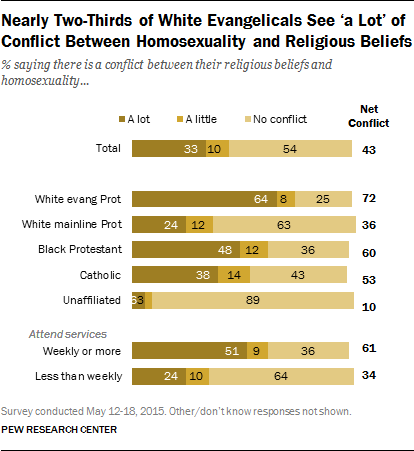
Conflict between religious beliefs and homosexuality is felt particularly strongly by white evangelical Protestants, about seven-in-ten (72%) of whom say there is a conflict, including 64% who say there is “a lot” of conflict. Six-in-ten black Protestants say there is either a lot (48%) or a little (12%) conflict between their religious beliefs and homosexuality, while 53% of Catholics feel that their religious beliefs and homosexuality are in some conflict (38% say there is a lot of conflict). By comparison, just 36% of white mainline Protestants and 10% of those without religious affiliation (10%) feel such a conflict.
Attendance at religious services is also associated with feelings of conflict between religious beliefs and homosexuality. Among those who go to services at least weekly, 61% say there is a conflict between their beliefs and homosexuality (51% perceive “a lot” of conflict). Roughly one-third of less-frequent attenders (34%) feel there is such a conflict, 64% do not.
Mixed Views on Why People Are Gay or Lesbian
When asked about possible reasons why people are gay or lesbian, 47% say people are born gay or lesbian, while slightly fewer (40%) say it’s just the way some people choose to live; relatively few (7%) say being gay or lesbian is a result of a person’s upbringing.
Over the past two years, the share saying people are born gay or lesbian has edged up six points. In May 2013, as many said people are born gay or lesbian (41%) as said it is just the way some people choose to live (42%).
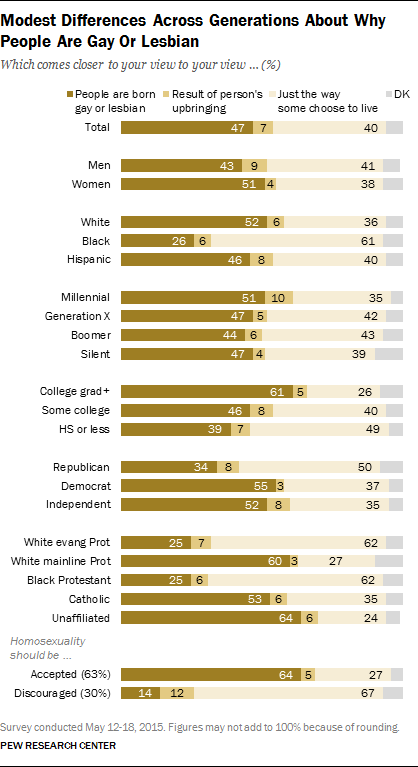
As with other attitudes on homosexuality, there are substantial racial, partisan and religious differences on why people are gay or lesbian. But the generational differences in these opinions are relatively modest.
About half of Millennials (51%) say people are born gay or lesbian compared with 47% of those in Generation X and the Silent Generation, and 44% of Baby Boomers.
There are striking differences between blacks and whites over why people are gay or lesbian. About six-in-ten blacks (61%) say being gay is just the way some choose to live; just 26% say people are born gay or lesbian. By contrast, more whites say people are born gay or lesbian (52%) than say it is a lifestyle choice (36%). Among Hispanics, about as many say people are born gay (46%) as say it’s a choice (40%).
College graduates are far more likely than those with less education to say that people are born gay or lesbian: 61% of college graduates say this, compared with 46% of those with some college experience and 39% of those with no college experience.
Comparable percentages of Democrats (55%) and independents (53%) say people are born gay or lesbian; about four-in-ten in each group say it’s just the way some people choose to live (37% of Democrats, 35% of independents). The reverse is true among Republicans: 50% say being gay or lesbian is just the way some people choose to live, compared with 34% who say people are born homosexual.
Identical majorities of white evangelical Protestants and black Protestants (62% each) say being gay or lesbian is just the way some people choose to live. By contrast, most white mainline Protestants (60%) say people are born homosexual, as do 53% of Catholics. Among the religiously unaffiliated, more see homosexuality as the way people are born than a lifestyle choice by a wide 64%-24% margin.

Most Say Gay or Lesbian Person’s Sexual Orientation Cannot Be Changed
A majority of Americans (60%) say they do not think a gay or lesbian person’s sexual orientation can be changed; about half as many (33%) say they think it can be changed.

The share saying a gay person’s sexual orientation cannot be changed has increased 18 points since 2003 (from 42%), and nine points in the past three years alone (from 51%).
Opinions about whether a gay or lesbian person’s sexual orientation can be changed largely mirror views of whether or not someone is born gay.
Overall, 70% of Democrats and 62% of independents say they do not think a gay or lesbian person’s sexual orientation can be changed, up nine points and 14 points, respectively, since 2012. By contrast, about as many Republicans say a gay or lesbian person’s sexual orientation can be changed (45%) as say it cannot be changed (47%); views among Republicans are little changed since 2012.
Among religious groups, 71% of white mainline Protestants and 68% of Catholics say homosexuality cannot be changed. Majorities of black Protestants (56%) and white evangelical Protestants (55%) say a gay person’s sexual orientation can be changed.
Adults with no religious affiliation are among the most likely to say that a gay person’s sexual orientation cannot be changed: 79% express this view, while just 18% say homosexuality can be changed.

Reactions to a Gay Child
Most Americans (57%) say they would not be upset if they had a child who told them he or she was gay or lesbian; 39% say they would be upset about this, including 17% who say they would be very upset.
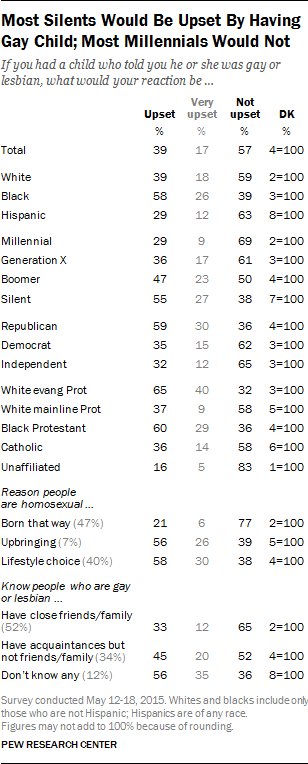
Views on this question are little changed over the past two years, but they have shifted dramatically since the question was first asked 30 years ago.
A 1985 Los Angeles Times poll found fully 89% said they would be either very upset (64%) or somewhat upset (25%) if their child told them he or she was gay or lesbian. By 2000, the share saying they would be upset about having a gay child had fallen to 73%, and by 2013 just 40% said they would be upset if a child of theirs said he or she was gay.
Reactions to the prospect of having a gay child are linked to other attitudes about homosexuality. For instance, 77% of those who say that homosexuals are born gay or lesbian would not be upset if they learned that their child was gay or lesbian. Nearly six-in-ten (58%) of those who view homosexuality as a lifestyle choice say they would be upset if their child disclosed that he or she was gay.
Racial, partisan and religious differences on this measure are substantial, as they are with other attitudes toward homosexuality.
However, generational differences in reactions to the prospect of a gay child are much wider than in opinions about whether or not a gay person is born that way, or whether a gay person’s sexual orientation can be changed. Nearly twice as many Silents (55%) as Millennials (29%) say they would be upset if they had a child tell them that he or she was gay or lesbian.
Younger Generations Most Accepting of Homosexuality
More than six-in-ten Americans (63%) say homosexuality should be accepted by society, while 30% say homosexuality should be discouraged. The share saying homosexuality should be accepted has grown steadily over the last decade; in 2003, the public was split on this question (47% accepted, 45% discouraged).
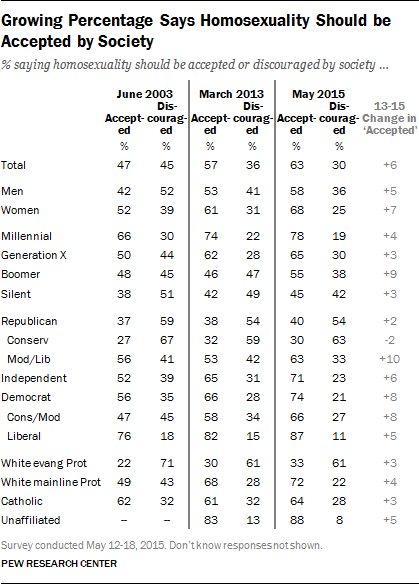
Today, about three-quarters of Democrats (74%) think homosexuality should be accepted, up from 66% in 2013 and 56% in 2003. Fully 87% of liberal Democrats say society should accept homosexuality, compared with 66% of conservative and moderate Democrats.
Among Republicans, 40% think homosexuality should be accepted and 54% say it should be discouraged – relatively unchanged since 2003. While three-in-ten conservative Republicans (30%) say it should be accepted by society, about twice as many moderate and liberal Republicans (63%) say this.
Younger generations are more accepting of homosexuality in society: 78% of Millennials, 65% of Gen Xers and 55% of Boomers say homosexuality should be accepted, while Silents are split (45% accepted, 42% discouraged).
White evangelical Protestants, on balance, say homosexuality should be discouraged (61% vs. 33%). By contrast, about seven-in-ten white mainline Protestants (72%) as well as 64% of Catholics and 88% of those who are religiously unaffiliated say it should be accepted by society.




